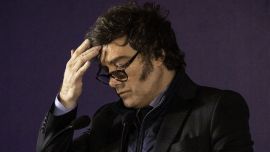Buenos Aires is gearing up to host the G20’s first high-profile event on Argentine soil, with the capital set to welcome the world’s elite economic leaders.On Monday and Tuesday (March 19 and 20), the finance ministers and central bank governors of the world’s largest 20 economies, with a retinue of businesspeople and lesser officials in tow, will come together for a series of meetings in the capital.
Among those attending are US Treasury Secretary Steven Mnuchin, Bank of England head Mark Carney, Britain’s Chancellor of the Exchequer Phillip Hammond and Brazil’s Finance Minister Henrique Meirelles. International Monetary Fund chief Christine Lagarde will become the organisation’s first director to visit the country in 15 years.
Lagarde, who is scheduled to meet with President Mauricio Macri, Treasury Minister Nicolás Dujovne and Central Bank Governor Federico Sturzenegger while in Argentina, participated in a conference at the Universidad Torcuato Di Tella on Thursday, where she offered support for the government’s economic policy of “gradualism.”
She said the govenrment was “attacking economic problems with determination, not in half measures, but on the basis of sustainable measures over time.”
The IMF chief also played down speculation that Macri would request IMF loans to the tune of US$10 billion, saying the government “hadn’t asked for it.”
Lagarde has already taken steps to influence the agenda of next week’s meetings, which looks set to be dominated by talk of US protectionism after US President Donald Trump introduced tariffs on steel and aluminium imports.
Also on Thursday, Lagarde issued a renewed warning against protectionism, saying moves to restrict trade threatened to slow the current global economic expansion.
“We know that the self-inflicted harm of import tariffs can be substantial even when trade partners do not retaliate with tariffs of their own,” Lagarde said in written remarks. “We also know that protectionism is pernicious because it puts the biggest strain on the poorest consumers who buy relatively more low-priced imports. In other words, harming trade is bad for the economy and bad for people.”
Earlier in the week, on Tuesday, she released a blog post that called for an increased focus on developing methods to control and regulate the use of cryptocurrencies. In the post, she writes that crypto-currencies are on the agenda for the heads of government summit in November, but the date of publication suggests this week’s event could play a part as well.
AGENDA-SETTER
The venue for the summit is the Buenos Aires Exhibition and Convention Centre (CEC), a massive 5,000-person capacity space in Recoleta that opened last Spring. Macri, Dujovne and Sturzenegger are the central figures leading the event, the first of five similar meetings for the same group of finance leaders in 2018.
The G20, or Group of 20, is an international forum designed to further economic and political cooperation between the world’s largest economies. It began in 1999 as a meeting between the finance ministers of the G7, a more exclusive group, and added a summit for heads of government in 2008. Together its member account for 85 of the world’s gross product, two-thirds of its population, 75 percent of international trade and 80 percent of global investment, according to fact-checking site Chequeado.
Argentina is the president — host, organiser and agenda-setter — of this year’s G20, the second time for a Latin American country after México hosted in 2012. Last year’s president was Germany. The government has set three central priorities for its G20 presidency: the future of work, infrastructure for development and a sustainable food future. The official theme is “Building consensus for fair and sustainable development.”
“Argentina attaches great importance to the G20, which it considers the main forum for international economic and financial coordination and which has become increasingly important in dealing with various policy issues with global impact,” the Foreign Ministry said in press statement.
The first G20 event of Argentina’s tenure took place last November in Bariloche, kicking off a schedule of 120 different events over the course of a year, culminating in the Leaders’ Summit from November 30 to December 1 in Buenos Aires, in which the heads of government from all 20 nations will gather for high-level talks.
Most events involve lowerlevel government and private sector actors from a variety of areas meeting in 11 cities across Argentina. They are divided into seven “engagement groups” that focus on broad topics such as women, business and science.
WORLD STAGE
As the G20 ramps up, some observers see it as a fascinating moment for Argentina on the world stage, coming at time when the country’s international status is on the up but global economic cohesion is in the tank.
“Having seen at first hand the dangers of defensive protectionism in Argentina, Macri may be able to provide a much need reinforcement of G20 support for free trade and multilateralism,” writes Richard Lapper, a fellow at Chatham House, a British think-tank.
As author Patricio Carmody wrote for the Times back in November, the G20 is also a chance for Argentina to show its mettle on the world stage, and demonstrate its importance.
Argentina has the second smallest economy of the group, beating out only South Africa. China, the United States and India top the list, while the only other Latin American nations are seventh (Brazil) and 11th (México). But it’s also a glorious opportunity to accomplish some things in the Macri administration wishlist.
“In building the G20’s programme, Argentina’s coordinators and negotiators will in fact manage two parallel agendas — an Argentine one, and another that reflects the outcomes of past summits,” Carmody wrote.
Spain, Chile and the Netherlands will all participate in the summit as special invitees, despite a lack of formal membership of the G20, as will major international institutions such as the United Nations, World Bank, African Union, and World Trade Organisation. The European Union as a political and economic bloc is also an official member.
Dujovne and Sturzenegger will give a press conference on Monday afternoon, following a full day of working sessions, while officials from visiting nations will speak to press the next day.
“We want to be the voice for an entire region, not just our country,” Macri said in November, when Argentina assumed the G20 presidency.
“This is why we will bring the aspirations and concerns of this entire developing region, eager for new opportunities, to the table at the G20.”

























Comments